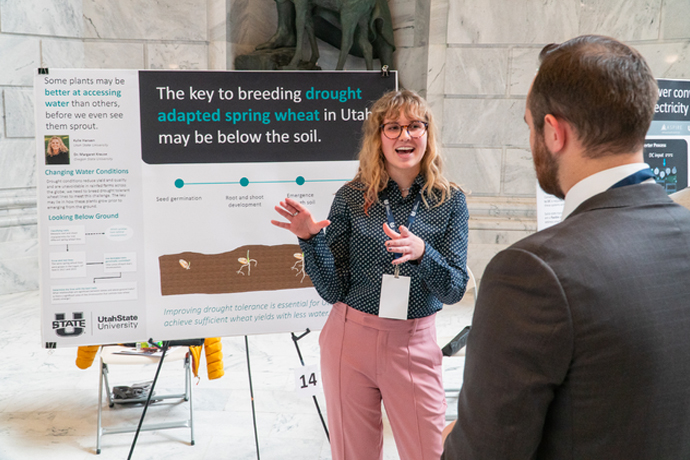USU Student’s Research Paves the Way for Drought-Resilient Crops
By Shelby Ruud Jarman | January 22, 2024


Even with record snowfall last year, Utah still faces long-term drought impacts. With much of the state covered in dry farmland, the need for crops that thrive in dry conditions is ever-present.
Research being done by Kylie Hansen, a student in Utah State University’s Department of Plants, Soils and Climate, aims to address this critical issue. Her work focuses on the genetics controlling plants’ root systems and coleoptile (the sheath covering the shoot) length and how they promote drought resistance.
“The current hypothesis is that a narrower root system that goes deeper will have more access to soil moisture,” she said. “So, a lot of Utah growers plant seeds deeper in the soil. But if they’re planted deeper, the shoots need a longer coleoptile so they can break the soil surface. Finding the genetics that control coleoptile length and root systems can improve drought tolerance.”
Along with 26 other Aggies, Hansen presented her research to legislators at the 2024 Undergraduate Research Day on Utah’s Capitol Hill on January 18.
Her research topic is extremely timely and highly important to lawmakers.
“Drought conditions are a continuous threat to Utah,” Hansen said. “We’re considered the second-driest state, and a lot of our water is used for irrigation. Producing wheat varieties that are inherently more drought-tolerant can help the state use water more efficiently.”
Along with faculty mentor Margaret Krause, formerly in USU’s Department of Plants, Soils and Climate, Hansen studies a wheat population named CIMMYT. Since this species is grown globally in various climates, the implications of Hansen’s work extend far beyond the borders of Utah. As she examines how genetic traits adapt to different conditions, her research could impact food systems and economies around the world.
For Hansen, this opportunity is more than just a presentation—it's a steppingstone to a future in academia. She plans to pursue a Ph.D. and views her Capitol Hill experience as valuable presentation practice. Teaching involves reaching a diverse audience, and this event gave her the skills to communicate complex scientific concepts to those unfamiliar with the field.
“These topics are important at every level of education,” she said. “I’m always excited to talk to people who aren’t as familiar with agriculture and bring attention to this side of science.”